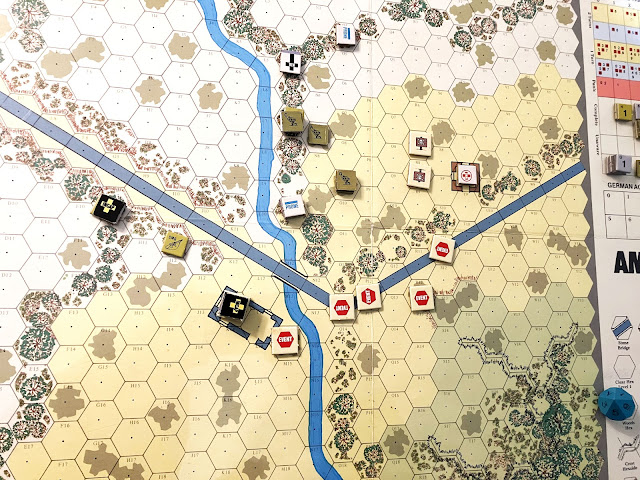Ambush!
I concur with the consensus; this is a great game. It’s sort of an rpg-lite, plays a little Hollywood in places, but it’s a squad level WW2 US infantry game originally set in Normandy, so forgivable in this case.
 |
| My secondhand copy. Box is pretty worn but the contents were in great shape. Can't recall how, where, or when I got it. Been sitting unplayed on the shelf for years. |
Some things that makes this game stand out are the presence of a real narrative serial type “what happens next?” vibe going on coupled with just the right amount of rules crunch that doesn’t bog down the pace or interrupt the flow, but rather enhances immersion. Really nice. No wonder it still has a dedicated following and continues to fetch high prices in the aftermarket even for well worn copies.
 |
| Pretty early in the first scenario. Discovered hostiles, so some Rounds have been played through, but haven't explored much. |
However, I’d say there are a couple potential problem areas with this game to be aware of if one is considering playing Ambush! for the first time:
- The rule book is poor by modern standards. I had a little trouble using it at first. There’s not enough cross-referencing, and there isn’t a “how to begin” type section. Book is really not organized to facilitate learning the game for the first time. Also, it lacks a “key terms” system to offset common terminology used in a game-specific context. That’s a newer development in rules writing, now become fairly standard, that I think really helps and could really help here.
Then there are typos and some actual errors in the text. But the errata is readily available for download online in more than one place and it really isn’t an issue because the game can be played 98% as written without the corrections even being necessary.
- There is definitely a learning curve with Ambush! so I think it best to just roll up sleeves and get in there. This approach, while good advice for initially learning any boardgame, is especially applicable to learning Ambush!. To really even figure it out what it's doing, you might just have to set it up and start to play through the turn sequences.
- Finally, and here’s some nitpicking, organizational issues with player aids. Some fussiness that could have been streamlined; the reference charts aren’t organized well. Flipping the chart and table sheet over, back and forth, does get a little annoying. There are a couple tables that you frequently use in conjunction with one another that are, inexplicably, on opposite sides of the player charts reference sheet, so you find yourself flipping the thing over and back again a lot. And that said, if looking things up bothers you, avoid this game entirely. Looking things up is part of the play as the engine is driven by referencing a chart for encounters and looking them up in a paragraph booklet. But this isn’t problem for me, personally.
 | |||
| Haha! Things kinda went south from this point. I didn't win, but came awfully close. Errors were made. |
More generally speaking, overall, the game sets a nice pace, with slower relaxed play during Operations, then increased intensity when dealing with Activated German soldiers during the Rounds. The paragraph system does limit replayability but there are a dozen or so scenarios in the first installment and several expansions for the base game out there.
If I wasn’t doing a survey in preparation for a new project, I’d spend more time with this right now. I almost certainly will play this again. And for a person interested in methods and tools for solitaire gaming this game merits study. From a design perspective, a number of interesting ways to address the solitaire player problem employed here.




